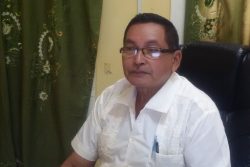The President of the Caribbean Court of Justice (CCJ), Michael de la Bastide, has expressed the hope that more countries will accept the appellate jurisdiction of the CCJ as the final court.
De la Bastide told the Caribbean Media Corporation (CMC) last week that he would like at least one or two other member states who signed the agreement establishing the regional court to do so, so that the Court can get more work.
However it seems as if he will have to wait for quite some time before this materialises since the Bruce Golding government in Jamaica has not listed the CCJ as one of its priorities for the New Year, and Belize which will hold its general elections on February 7 has not included the CCJ and the abolition of the Privy Council as the final court as one of the issues for the electorate, but the Belizeans will vote on whether or not there should be an elected senate
Golding announced 4 priorities for 2008: (1) more authority to the parliamentary opposition, (2) greater freedom to the press, (3) strengthening and protecting the rights of ordinary citizens and (4) stamping out corruption. No reference was made to the CCJ and the Privy Council.
The Jamaica Labour Party (JLP) government in 1988 under the leadership of Edward Seaga as well as the government of Trinidad and Tobago were in the forefront of the establishment of the regional court, but there has been a change of heart by the JLP after it lost the government. However there is an indication that the new Prime Minister Mr. Golding who took office last September will take steps to remove the Privy Council as the final court but it is not known when this will be done.
It is understood that Jamaicans are concerned about the costs of the court, the retention of the death penalty and the fact that although Jamaica has the largest population, no Jamaican is included in the panel of judges of the regional court.
The Trinidad and Tobago government and the opposition are at loggerheads and it is not likely that early steps will be taken for a constitutional amendment to abolish the Privy Council as the final court.
Since the court was inaugurated on April 16, 2005, general elections were held in St. Vincent and the Grenadines, St. Lucia, Jamaica, and Trinidad and Tobago and the electorates were not asked to vote on whether or not the Privy Council should be removed as the final court.
So far only Guyana and Barbados, two of the 12 countries which signed the agreement establishing the regional Court have accepted the appellate jurisdiction of the CCJ.
The OECS countries, Antigua and Barbuda, Dominica, Grenada, St. Kitts /Nevis, St. Lucia, and St, Vincent and the Grenadines, will have to amend their constitutions to remove the Privy Council as the final court, and it seems as if these governments are not in a hurry to ask the electorate to do so.
The Dutch speaking country of Suriname is still to join.
Last week’s call by the CCJ Head for the Caricom governments to make use of the court was not the first time that Mr de la Bastide has urged the respective governments to join the regional court. He did so at a presentation in Jamaica, and in the first publication of the annual report of the CCJ he wrote “I do not hide my disappointment and that of my colleagues that to date only Barbados and Guyana have accepted the Court as the final Court of Appeal in substitution for the Privy Council.”
In its 32 months of existence, eight substantive appeals and several applications for leave to appeal were dealt with, and Mr. de la Bastide in his interview with CMC said that the court received nine appeals from Guyana in 2007 which will have to go to management process before being heard.








